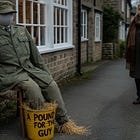New to Brittle Views? This space spans grief and mischief, punk nostalgia and quiet reckonings—essays, fiction, satire, and stories that don’t sit still. If you like writing that lingers as much as it lands, you’re in the right place.
This past week carried its own thread of defiance and presence. From erased murals and stripped commons to family doors reopening in whispers, from effigies in the village square to a wedding toast lifted in quiet release, each piece asks what endures when memory is threatened or silence weighs heavy.
Here’s everything from the last seven days—each with its own resonance:
Essays
After returning from the UK, I found Tampa Bay streets stripped bare: murals erased, rainbow crosswalks scrubbed before dawn, and vaccine protections under attack. A meditation on how abandonment is dressed up as liberty, erasure as order. But also a refusal: the commons we keep—the color, the memory, the solidarity—remains ours.
An alternative, more raw version of the above essay. Where What They Can’t Scrub Away was measured, this piece is searing: a poem born of anger, naming the violence of erasure and insisting on memory’s endurance. Chalk dust, it says, always rises.
Short Stories
Based on a 2021 poem (No More Talk), this re-entry becomes a story about release, resilience, and the courage to carry forward only what belongs. At a wedding reception, the narrator lifts a glass—not for what was lost, but for what endures. A story about how memory and rhythm shift from restraint to quiet freedom.
The Maggie B. Casefiles
A village mischief revives the old “penny for the guy”—inflated now to a pound. But what begins as play turns heavy when Reginald Smythe-Harrington recognizes his old Falklands jacket stuffed around straw. Maggie’s notes mark the weight of absence dressed in scraps, how memory sits even when the effigy is gone.
Holding On
Rachel’s anger gives way to reckoning. Chris steadies her, Lily’s stories echo, and Emma reopens the door she slammed in silence. A chapter about bridges rebuilt in whispers, presence carried in touch, and the weight of grief turning—if only slightly—toward space.
Poetry
After nearly forty trips back to the UK, this one stayed. Presence becomes the word to hold it all: trains and tracks, family and friends, silences and skies. A poem about how staying—unmeasured, unhurried—can change what it means to return.
Together, these works chart a week of witness and refusal: effigies that almost breathe, families that almost break, murals that almost vanish. Each piece insists on what endures—whether memory, presence, or the small rebellions of chalk, rhythm, and story.



![What They Can’t Scrub Away [Narrated]](https://substackcdn.com/image/fetch/$s_!nWkw!,w_140,h_140,c_fill,f_auto,q_auto:good,fl_progressive:steep,g_auto/https%3A%2F%2Fsubstack-post-media.s3.amazonaws.com%2Fpublic%2Fimages%2Fc4a05b3f-3aba-496e-b02b-d4775e5d434a_1920x1080.jpeg)
![Chalk Dust Rising [Narrated]](https://substackcdn.com/image/fetch/$s_!sU3H!,w_140,h_140,c_fill,f_auto,q_auto:good,fl_progressive:steep,g_auto/https%3A%2F%2Fsubstack-post-media.s3.amazonaws.com%2Fpublic%2Fimages%2F14f4db00-832d-44b9-b991-43b3a2fdbb4d_1408x768.jpeg)
![What I Choose to Keep [Narrated]](https://substackcdn.com/image/fetch/$s_!E18Z!,w_140,h_140,c_fill,f_auto,q_auto:good,fl_progressive:steep,g_auto/https%3A%2F%2Fsubstack-post-media.s3.amazonaws.com%2Fpublic%2Fimages%2F788175ac-c837-40fe-804e-616943925c80_1408x768.jpeg)

![Chapter Sixteen – Holding On [Narrated]](https://substackcdn.com/image/fetch/$s_!wMMv!,w_140,h_140,c_fill,f_auto,q_auto:good,fl_progressive:steep,g_auto/https%3A%2F%2Fsubstack-post-media.s3.amazonaws.com%2Fpublic%2Fimages%2Fb135546b-13e6-4518-b6c0-fea3d7428e96_1536x1024.png)
